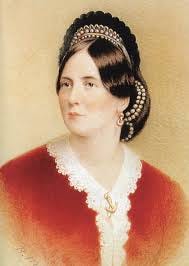
Every time I speak to my mum on the phone we have at least one laugh and she recites at least one line of poetry to me. Recently we were chatting and, as the best conversations go, we rambled across one conversational heath to another. We wandered from extolling the marvellousness of her grandchildren, to harumphing at the state of the world, finally winding up at our favourite watering hole –poetry. Mum, like Shocky, has a deep well of learned poems and that day quoted from Oscar Wilde’s The Ballad of Reading Gaol –
Yet each man kills the thing he loves/By each let this be heard,/Some do it with a bitter look,/Some with a flattering word,/The coward does it with a kiss,/The brave man with a sword!
Mum told me she read somewhere that Oscar Wilde’s father, a renowned oculist, had left the eyeball of a patient he was operating on in a dish nearby. When he reached to return it to its socket Lord William Wilde realized the cat had eaten it. That opportunistic feline had a bellyful of someone else’s visions for the remainder of its remaining lives.
After our chat, I remembered all the reasons I adored the quick quipping, vermillion-coat wearing, poet-prisoner (portrayed many times on the screen but most brilliantly by British Actor Stephen Fry – a movie after which I could not eat my post-show plate of chips, so overly salted were they by my tears).
From the first moment I read Oscar Wilde’s work, I was mesmerized. I couldn’t get enough of that floppy hair, the flamboyance of dress, his petulant pout, but mostly those searing and clever witticisms.
Some cause happiness wherever they go; some whenever they go.
Always forgive your enemies, nothing annoys them so much.
The suspense is terrible, I hope it lasts.
Man he was quick! A literary sharp-shooter – Annie Oakley for the Salon Set.
I remembered another quote from him. “Fathers should be neither seen nor heard,” he wrote in An Ideal Husband. “Not mothers. Mothers are darlings.” Although a respected doctor, and liberal humanitarian, his father was an enigmatic rascal. Willie Wilde died leaving his finances in a precarious state and his wife and children (three illegitimate and three by his wife, Jane Wilde) to survive genteel poverty.
Perhaps Oscar Wilde had no time for his father but for his mother? Oh boy, he adored the six-foot tall Lady Wilde, née Jane Elgee, who wrote poems and essays under the sobriquet, Speranza. He was heavily influenced by her, not only in dress, and writing but also in his view of the world. His love of the other. His non-judgemental way of viewing that other and seeing the other within himself. All those roads travelled with a light joyous step until he was sent to prison for gross indecency.
Oscar mirrored his mum in many ways starting with his way of dressing. The bodacious Jane Wilde spent many years fitted out in an astonishing array of clothes, including dressing as a druidess when she was a younger woman. She virulently opposed any reason not to Bring It! when donning one’s attire for the day.
“Humanity is distinguished from apes in two things; laughter and dress,” she wrote. “Nothing generates a morbid discontent like sombre, monotonous, ineffective costume.”
Jane’s idea of truth and how she wanted to wield it was her own. And why not? She certainly had the imagination and ready turn-of-phrase to pull off whatever reality she wanted to invent. Despite coming from a background of ordinary tradesmen, she created a different history for her family weaving a filigreed genealogy tracing her roots back to Dante Alighieri.
On one hand she was a loud and proud advocator for women’s rights. She complained one could hear the “clank of their fetters” throughout the ages. On the other, she was a fool for love and completely subsumed herself for her brilliant but socially reckless husband. Soon after marrying William Wilde, Jane claimed that nothing interested her beyond the desire to make him happy. “For this I could kill myself.” I imagine her striking her ample bosom, dark eyes glittering, and over-sized earrings clanking.
Even when she lost everything people still flocked to see her “at homes” so enchanting was her charisma and conversation. Like Oscar she had a deep understanding of the power of language and how it could be manipulated. “Paradox is the very essence of social wit and brilliancy,” she proclaimed. Jane Wilde bequeathed so much of her raw talent to her son. It’s as if she tossed glowing embers of extraordinary eloquence into Oscar’s lap and he fanned those embers into a roaring inferno of plays, novels and poetry.
Oscar Wilde was a proud Irishman and was quoted as saying that he was “not English: I’m Irish which is quite another thing.” He was no doubt influenced by Jane- a staunch Irish nationalist who wrote essays and poems excoriating the British for their treatment of the Irish and for causing the Great Famine of 1845. In her poem about the potato famine, named The Famine Year, she exposes the British landlords who gave away the country’s agricultural riches while Ireland’s own people starved by the millions:
Fainting forms, hunger-stricken, what see you in the offing? /Stately ships to bear our food away, amid the stranger's scoffing. /There's a proud array of soldiers -- what do they round your door? /They guard our masters' granaries from the thin hands of the poor.
Her poem The Brothers is often compared to The Ballad of Reading Gaol. Both poems turn their spotlight on imprisoned men awaiting execution. The latter poem is longer, its refrain returning to man’s inescapable destructive destiny – the killing of love.
Some kill their love when they are young, /And some when they are old;/ Some strangle with the hands of Lust, /Some with the hands of Gold:
Some love too little, some too long, /Some sell, and others buy; /Some do the deed with many tears, /And some without a sigh:
How right he was to say that hearts are made to be broken. How shattered his own must have been as he fell spectacularly from grace - like the archangel Lucifer, God’s anointed cherubim, who fell from heaven to hell. Oscar Wilde was once a celebrated comedic playwright. Audiences thronged to his plays. They lapped up his acerbic wit and satirical writing style. The Importance of Being Earnest had just celebrated its opening season when Wilde went on trial for homosexual behaviour. The play was a smash hit but had to close early because of all the scandal. Wilde’s reputation was shot. He was hunted by thugs on the streets before ending up in prison. He wrote The Ballad of Reading Gaol when he was released from two years of hard labour, vilified and penniless. Constance, his wife and children had abandoned him. Alfred Douglas, his alleged lover and the reason he went to prison in the first place was no longer in his life.
Contrary to popular rumour after his death, Oscar Wilde did not die of syphilis but from acute meningitis. He had suffered chronic ear disease for many years even before going to Reading, although falling and hitting his head on the cold, stone floor while in jail probably didn’t help matters. Doctors tried a radical mastiodectomy to remove a tumour from his middle ear, but the operation was unsuccessful. Before Oscar’s magnificent voice was forever silenced by an ear infection how low he must have felt in his seedy Paris bedsit when he wrote those words “each man kills the thing he loves”.
He had done that very thing over and over. If we are to imagine he believed his own epigram “to fall in love with oneself is the beginning of a lifelong romance” the once upon a time cock-of-the-walk, poseur and aesthete killed his love of self too.
Wilde may have said “All women become like their mothers. That is their tragedy. No man does, and that is his.” But not this mother/son duo. Oscar’s tragedy lay elsewhere but not because he was different from his mum. However, his mother’s last words to him may have contributed to Oscar’s imprisonment and eventual death. While his friends urged him to flee England in order to escape jail, Jane begged him to stay saying if he left the country she would never talk to him again.
She loved him to death.

Speaking of Love - Next Month …
Next month I’m celebrating love in all its guises. Send me a line or two from your favourite love poem and maybe explain why you adore those words. I would like to interweave your thoughts into my St. Valentine’s Day essay.





Thank you--I learned so much about Wilde, and his mother Jane sounds like quite a character, muse, fashion inspiration, and source of grief.
Oh my how I love this post! I didn't know anything about OW's mother. What a trove you've offered. And now I want to rewatch the Stephen Frye film... Thanks, Shocky.